Part 2: Adjusting to Online Learning
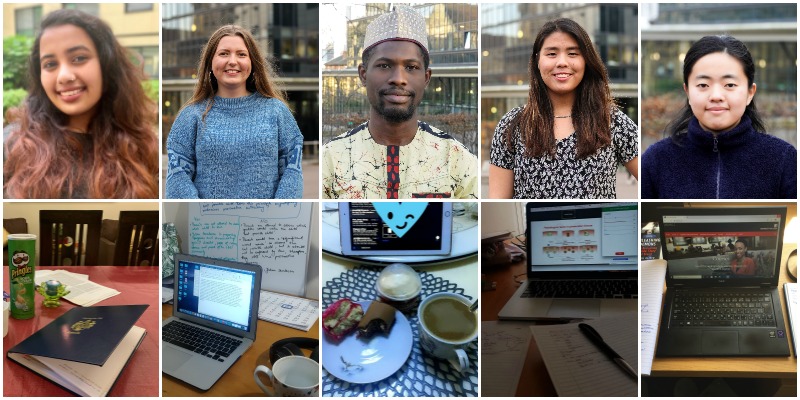
Hey, I’m Vaiva, a Philosophy, Politics and Economics student from Lithuania. With Simran, Suhaib, Sara, and Shiwei we are going to tell you about our experiences of shifting to online learning and adapting to a new online system of education…let me start…
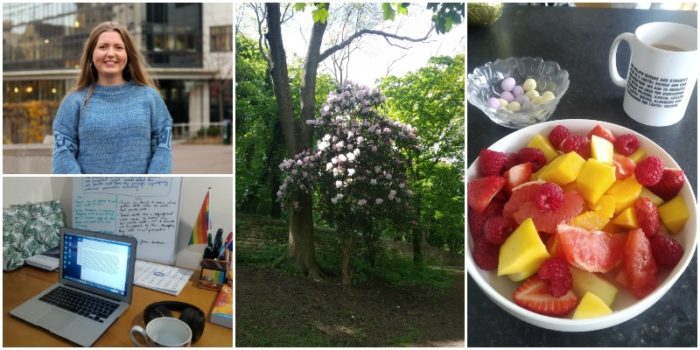
Vaiva: Learning to appreciate the little things…
To tell you the truth, I found it incredibly difficult to adapt to spending all of my time at home and studying from the office of my living room. I used to be that person, who gets up early in the morning, has their day planned out on Google Calendar to the smallest detail, trying to achieve as much as possible in a day and not losing productivity until very late in the evening. I have to say, I love learning, working, and seeing myself be productive. Although my daily routine was intense, and I would sometimes have lunch on the go or find myself exhausted, it gave me peace at the end of the day to say I did all of the work I intended to do. I also felt that my motivation would increase by seeing my peers’ study in the library until the building closed or being able to talk to people in my office during a break.
Quarantine put my life upside down and I had to learn how to make it work. I had fewer commitments, yet it felt like I wasn’t able to manage my time as well. Only after a month of quarantine, I was able to be at peace with the idea of studying from home when I realised how much I rely on my work and productivity as a measure of self-satisfaction. I adopted new routines and I understood that I didn’t always need to be productive to be happy. I started going on daily walks to different parks in Leeds or playing basketball and doing these little changes slowed the pace of my day, which made me appreciate things I would normally not notice. My highlight of online learning was being able to work at any time that is appropriate for me. As a night owl, I was finally able to sleep in longer and write my essays or do my course readings in the evenings instead of early morning, which I enjoyed a lot. Overall, I would say that online learning taught me how to see it as an opportunity to appreciate other things in life instead of productivity.
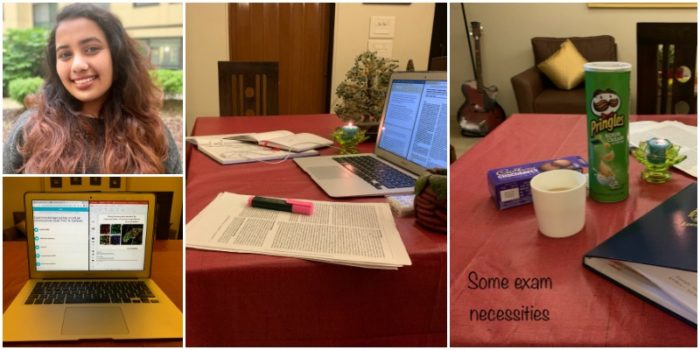
Simran: Completing my Final Year
The situation with COVID-19 has been overwhelming and at the beginning of March, had us final year students worried sick as we expected to be in an extremely disadvantage with our education. We were informed that we were going to complete our last year online, which led us to feel more anxious. Nevertheless, a few months down, having completed my exams and dissertation online, I can confidently say transitioning online and adapting to learning from home has been a rather easy experience. I study B.Sc. Neuroscience taught within the School of Biomedical Sciences. The transition was so smooth and satisfying because of the umpteen efforts made by the faculty and the university as a whole.
This transition occurred just as I completed my final year lab and was expected to write a lab report as my dissertation. The thought of completing this project away from the university campus and online was daunting. However, throughout the project, right up until the deadline, we received support by members of the faculty through a number of emails, documents, zoom calls, revised protocols, etc. My project supervisor, who also happened to be my personal tutor, was extremely understanding and was quick to reply to every doubt and uncertainty I felt.
When it came to the exam that I had to complete, the format was revised to ensure that every student, in every situation was capable of completing it with ease. Our lectures were in the form of ‘lecture captures’ and sometimes we were provided with captures from different years just to ensure that we all received the information required. Links to academic papers, articles, tutorials, eased our last year of our academic journey. My overall experience with the University of Leeds has been extremely rewarding, nevertheless, it is the online support I’ve received in the last couple of months that I have been most thankful off.

Suhaib: An enjoyable experience and a time to enhance skills…
Since moving online, I will say the experience has been quite interesting beyond what I would have anticipated. Interestingly, lecturers are actually very open to jump online, and answer students queries in the form of tutorial sessions. Also, collaboration amongst fellow students have since improved as we utilise Microsoft Teams a lot in having informal chats, assignment discussion, as well as holding meetings like Student-Staff Forum (I loved the experience. haha!). Lastly, my dissertation meeting with Supervisor's has been smooth as almost all students meet with their Supervisor's online (via Microsoft Teams) either once a week or bi-weekly. On this, I feel less pressure on the deadlines and I am enjoying our meetings online. Overall, I will say it’s being an enjoyable experience and I have enhanced skills digitally that we know companies all around the world will be looking to advance from this lock down. Though we miss the buzz that is on campus from the students and the experience with friends, we keep trying to look at the positives in the situation- hope you all are staying safe and healthy!
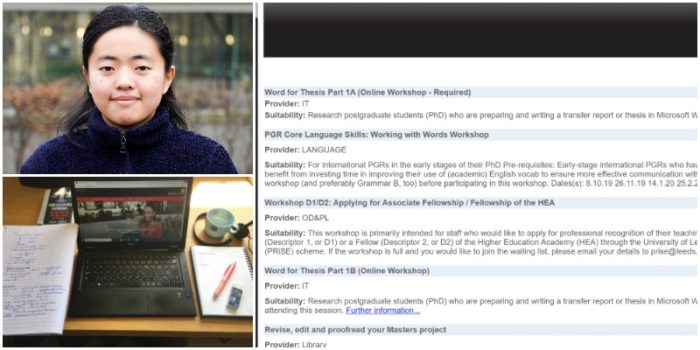
Sara: the workshops are as good as doing it face-to-face…
Since the lockdown started in the UK, many of the workshops organised by the university went online. As a postgraduate research student, I needed to attend 10 of these workshops per year. There are many different types of workshops, and they vary from data management, ethical considerations in research to teaching and using software such as NVIVO and Endnote. That is why it was very important for me to sign up to these workshops offered online. I was able to attend 2 workshops; one was on navigating Word documents and the other was on how to use R programming for research. These were long workshops spanning several days, and so long some of them even needed tea breaks! But these workshops have been extremely well organised, and it was in my opinion as good as doing it face-to-face. These workshops are offered by many different institutions within the university such as the IT centre and the library (called Skills@Library). The workshops were usually operated using Blackboard Ultra it was very easy to access.
Also, due to the current lockdown measures, the university is offering more access to online learning tools for free such as LinkedIn Learning, Coursera, and Future Learn. I have started learning how to code, conduct data analysis, and using Excel for research. These workshops have helped immensely in my research and I almost wish I knew about them as an undergraduate student! The transition from face-to-face to online workshops has been surprisingly smooth. These workshops are a great way to keep in touch with other postgraduate research students from other disciplines who are participating in the workshops. It is also a fantastic way to learn new skills or improve on your existing skills. There are workshops offered for undergraduate and masters students too, so even if you are not a postgraduate research student, I strongly recommend signing up to these workshops available once you come to Leeds!
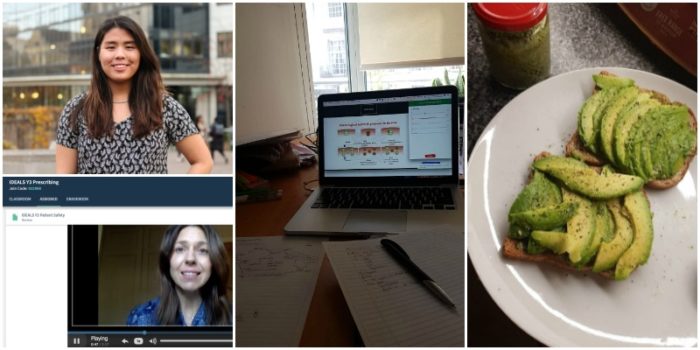
Shiwei: The perspective of one of our lecturers...
As a medical student in my clinical years, teaching usually occurs through the process of shadowing doctors on placement, attending small-group teachings, lectures and with self-directed learning. However, as the pandemic hit, the school had to figure out innovative ways in order for us to receive teaching we need to help us progress to the following year, and hence, swiftly made a transition to online learning. For example, for one of our IDEALS Prescribing module that would have been carried out in small groups of around 15 students was now transformed into an interactive online module on Top Hat, with various videos and self-test questions in order to aid our learning. In addition to studying the learning the material already provided by the medical school, I found myself watching Sustaining Medical Education in a Lockdown Environment (SMILE) lectures which are amazing, free and online Zoom lectures with medical students from across the world! This has truly helped me stay motivated through lockdown as it was comforting to find other medical students on the same boat, to work as hard as we can even in these difficult times. As exam season approached, our summative exam was made formative and online instead of in-person. We were given a 48-hour period to complete the exam to counter any possible technical difficulties and time differences between students. Once the exam has completed, we were able to check through the answers, which allowed me to reflect on the mistakes I have made and build on my knowledge!
And now that you have had a good insight of how us students are adjusting, what about the lecturers at University? How do they feel about the change? Through attending the Faculty of Medicine and Health (FMH) Global Community events, I had the great pleasure of getting acquainted with Professor Linda McGowan, the Pro-Dean for the International FMH, who kindly gave us her insight on how the switch has impacted academic staff as outlined with my questions below:
Q: How have you found the shift to online teaching? What changes did you have to make?
I have had experience of doing Webinars online but each system you use is different. My first online talk was given via Blackboard Collaborate and I had never used it before - the facilitator was great and talked me though it uploaded my material and then sent me a link to join. I think once one session goes well you gain more confidence and also learn to use the tolls within the systems which can enhance the learning experience e.g. virtual break out rooms; voting buttons etc.
Do you think there are any benefits to the switch?
Yes, in terms of it really makes you think about how to deliver the learning material, length of session, break out groups etc. using all sorts of techniques to make the session more interesting and to encourage student interaction - you cannot just turn up deliver your lecture and go!
Moving forward, there will be a rise in online universities and even schools that allow students to take up internships in various countries, whilst delivering most of their curriculum to students online. Do you think there will be a shift in higher education to increase more online teaching and learning in the future?
Definitely. There was a lot of innovative stuff going on at Leeds but to be honest I had only dipped my toe in the water whereas the pandemic meant I had to swim and swim fast! It was very stressful for lecturers at the beginning because it was a rush to get things online and also you have the technology to worry about if the connection does not work it is hard to have a Plan B - now the dust is settling I have done some training on Blackboard Collaborate and really enjoyed my last lecture where I was able to make it much more interactive and hopefully more engaging for the students. I think a more blended learning environment will be the way forward for all HEIs.
Conclusion: We have come together and done our best to adapt…
Overall, it is truly amazing how students and academic staff are able to come together and do our best to adapt to such unprecedented circumstances. Although the switch to such heavy online learning was not what us students expected, we are fortunate enough to receive such tremendous support from academic staff, who have been so understanding regarding the impact the pandemic has had on students, such as providing extensions to students finding trouble in completing assignments in this difficult time. From an academic’s perspective, it is clear that the skills honed through the push for online teaching and the benefits highlighted such as allowing academics to improve their techniques and increase engagement with students is invaluable. Advancing from the lessons the pandemic has taught academics, it is likely that higher education institutions will see more incorporation of online teaching in future curriculums.
